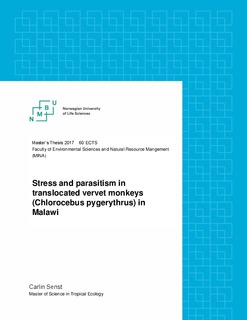Stress and parasitism in translocated vervet monkeys (Chlorocebus pygerythrus) in Malawi
Master thesis
Permanent lenke
http://hdl.handle.net/11250/2450151Utgivelsesdato
2017-05Metadata
Vis full innførselSamlinger
- Master's theses (INA) [593]
Sammendrag
Wildlife translocations are a contentious practice that is on the rise. Wildlife rescue and release centers are one of the largest practitioners of translocation, but are often overlooked by the scientific community. In order to increase the success rates and efficiency of translocation projects it is necessary to highlight the reasons for project successes as well as project failures. This study aims to explore the relationship between two of the most commonly cited reasons for translocation failure, stress and illness, in a troop of translocated vervet monkeys (Chlorocebus pygerythrus) in Malawi. To do this, level of stress was determined through behavioral observations while binomial infection status and infection densities of parasitic helminth groups was determined through collection of fecal samples and a variety of diagnostic techniques. These translocated individuals showed higher helminth eggs per gram (EPG) than their wild counterparts. Individuals that displayed more stress related behavior had a higher chance of being positive for helminth infection, strongly suggesting that immunological impact of chronic stress incurred from being held in captivity. Juveniles tended to be more stressed than adults even though they tended to have lower EPG’s. This discrepancy may be explained by the fact that juveniles alter social interaction with infected individuals, possibly to reduce the chances of being infected themselves. These results show that there is a significant relationship between stress and helminth infection. This conclusion has wide-ranging management implication both in the translocation field as well as more general wildlife management.

